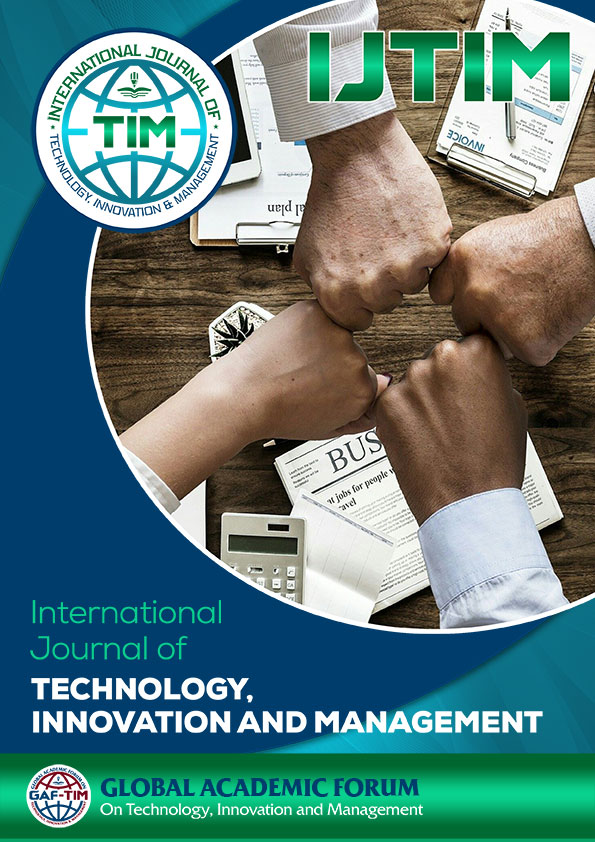Exploring the Dynamics of Technological Innovation in Contemporary Environments and their Impact on Logistics Management Efficiency: An Empirical Study
DOI:
https://doi.org/10.54489/ijtim.v3i2.289Keywords:
Contemporary environment,, technological innovation,, efficient logistics chain management,, the General Company for Electricity Production/ Basra.Abstract
The research aims to explore the extent of the impact of the interaction of (the contemporary environment and technological innovation) on the level of efficiency of supply management in the electric power production company in Basra Governorate. To achieve the purpose of this paper, The methodology was by the contents of the descriptive approach, where the theoretical presentation and discussion of the research topic were carried out. The population of the research was the Electric Power Production Company in Basra Governorate. The questionnaire was used as a surevy instrument to collect data from on service employees in the company. The SPSS used to assess the statistics of the data. It became clear from the analysis and discussion that technological innovation significantly enhances the efficiency of logistics management of the Iraqi Energy Production Company in the contemporary environment. Technological innovation was measured to fill the past studies gap to enhance the efficiency of logistics chain management, because we rarely find in Arab and foreign studies that have dealt with three variables, and this paper provides added scientific value to researchers in the field Electrical energy in Iraq, and the economic value of the company.
References
Abdallah, L., Persson, M., 2014. The effects of environmental uncertainty conditions on organisational innovativeness and performance of SMEs . 1–51.
Aljumah, A.I., Shahroor, H., Nuseir, M.T., El Refae, G.A., 2022. The effects of employee commitment and environment uncertainty on product quality: The mediating role of supply chain integration. Uncertain Supply Chain Manag. 10, 1379–1386. DOI: https://doi.org/10.5267/j.uscm.2022.7.001
Bennett, P., 1989. Stress management for wellness, Journal of Psychosomatic Research. Harcourt Brace College Publishers, Orlando, FL, US. DOI: https://doi.org/10.1016/0022-3999(89)90119-0
Chen, J., Shu, W., Wang, X., Sial, M.S., Sehleanu, M., Badulescu, D., 2022. The impact of environmental uncertainty on corporate innovation: Empirical evidence from an emerging economy. Int. J. Environ. Res. Public Health 19. DOI: https://doi.org/10.3390/ijerph19010334
El Khatib, M., Alabdooli, K., AlKaabi, A., Al Harmoodi, S., 2020. Sustainable Project Management: Trends and Alignment. Theor. Econ. Lett. 10, 1276–1291. DOI: https://doi.org/10.4236/tel.2020.106078
Ghosh, S., Amaya, L., Skibniewski, M.J., 2012. Identifying areas of knowledge governance for successful projects. J. Civ. Eng. Manag. 18, 495–504. DOI: https://doi.org/10.3846/13923730.2012.700642
Jiang, Y., Ritchie, B.W., Verreynne, M.L., 2019. Building tourism organizational resilience to crises and disasters: A dynamic capabilities view. Int. J. Tour. Res. 21, 882–900. DOI: https://doi.org/10.1002/jtr.2312
Madi Odeh, R.B.S., Obeidat, B.Y., Jaradat, M.O., Masa’deh, R., Alshurideh, M.T., 2021. The transformational leadership role in achieving organizational resilience through adaptive cultures: the case of Dubai service sector. Int. J. Product. Perform. Manag. DOI: https://doi.org/10.1108/IJPPM-02-2021-0093
Murphy, L.R., 1996. Stress management in work settings: A critical review of the health effects. Am. J. Heal. Promot. 11, 112–135. DOI: https://doi.org/10.4278/0890-1171-11.2.112
Pires, R., Alves, M.C.G., 2022. The Impact of Environmental
Uncertainty on Accounting Information Relevance and Performance: A Contingency Approach. Economies 10.
Upson, J.W., KETCHEN, D.J., IRELAND, R.D., 2007. Managing
Employee Stress:. A Key to the Effectiveness of Strategic Supply Chain Management. Organ. Dyn. 36, 78–92.
Zubizarreta, M., Ganzarain, J., Cuadrado, J., Lizarralde, R., 2021. Evaluating disruptive innovation project management capabilities. Sustain. 13, 1–22. DOI: https://doi.org/10.3390/su13010001
Sun, X., Yu, H., Solvang, W.D. et al. The application of Industry
0 technologies in sustainable logistics: a systematic literature review (2012–2020) to explore future research opportunities. Environ Sci Pollut Res 29, 9560–9591 (2022). https://doi.org/10.1007/s11356- DOI: https://doi.org/10.1007/s11356-021-17693-y
-17693-y.
Yasmeen, Humaira & Tan, Qingmei & Zameer, Hashim & Tan, Junlan & Nawaz, Kishwar. (2020). Exploring the impact of technological innovation, environmental regulations and urbanization on ecological efficiency of China in the context of COP21. Journal of Environmental Management. 273. 10.1016/j.jenvman.2020.111210. DOI: https://doi.org/10.1016/j.jenvman.2020.111210
Choi, Donghyun, and Bomi Song. 2018. "Exploring Technological Trends in Logistics: Topic Modeling- Based Patent Analysis" Sustainability 10, no. 8: 2810. https://doi.org/10.3390/su10082810. DOI: https://doi.org/10.3390/su10082810
Zhang, Yongan, Umair Khan, Seoyeon Lee, and Madiha Salik. 2019. "The Influence of Management Innovation and Technological Innovation on Organization Performance. A Mediating Role of Sustainability" Sustainability 11, no. 2: 495. https://doi.org/10.3390/su11020495 DOI: https://doi.org/10.3390/su11020495
Bellingkrodt, S. and Wallenburg, C.M. (2013), “The role of external relationships for LSP innovativeness: a contingency approach”, Journal of Business Logistics, Vol. 34 No. 3, pp. 209-21. DOI: https://doi.org/10.1111/jbl.12020
Cichosz, M., Goldsby, T.J., Knemeyer, A.M. and Taylor, D.F. (20 17), “Innovations in logistics outsourcing relationship – in the search of customer satisfaction”, LogForum, Vol. 13 No. 2, pp. 209-219.
Fawcett, S.E., Wallin, C., Allred, C., Fawcett, A.M. and Magnan,
G.M. (2011), “Information technology as an enabler of supply chain collaboration: a dynamic-capabilities perspective”, Journal of Supply Chain Management, Vol. 47 No. 1, pp. 38-59. DOI: https://doi.org/10.1111/j.1745-493X.2010.03213.x
Germain, R., Droge, C. and Daugherty, P.J. (1994), “A cost and impact typology of logistics technology and the effect of its adoption on organizational practice”, Journal of Business Logistics, Vol. 15 No. 2, pp. 227-240.















